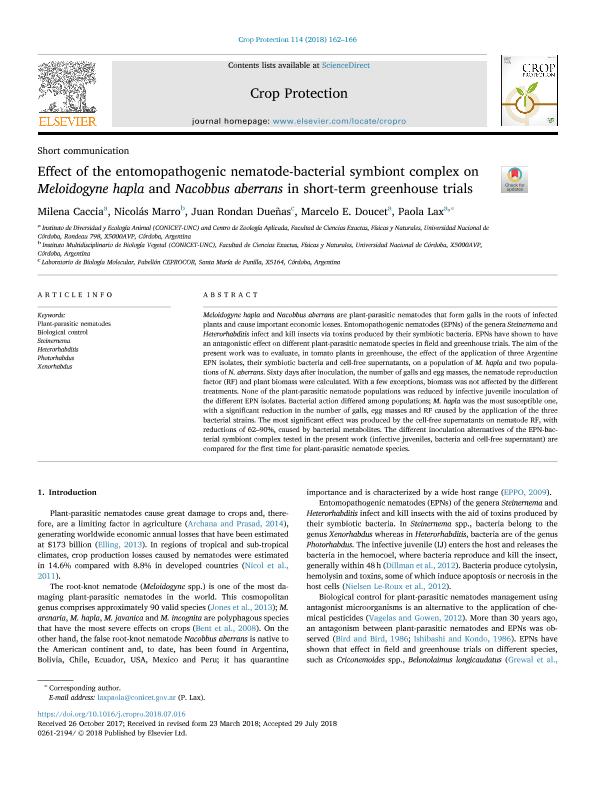Artículo
Effect of the entomopathogenic nematode-bacterial symbiont complex on Meloidogyne hapla and Nacobbus aberrans in short-term greenhouse trials
Caccia, Milena Guadalupe ; Marro, Nicolás Alejandro
; Marro, Nicolás Alejandro ; Rondan Dueñas, Juan; Doucet, Marcelo Edmundo
; Rondan Dueñas, Juan; Doucet, Marcelo Edmundo ; Lax, Paola
; Lax, Paola
 ; Marro, Nicolás Alejandro
; Marro, Nicolás Alejandro ; Rondan Dueñas, Juan; Doucet, Marcelo Edmundo
; Rondan Dueñas, Juan; Doucet, Marcelo Edmundo ; Lax, Paola
; Lax, Paola
Fecha de publicación:
12/2018
Editorial:
Elsevier
Revista:
Crop Protection
ISSN:
0261-2194
Idioma:
Inglés
Tipo de recurso:
Artículo publicado
Clasificación temática:
Resumen
Meloidogyne hapla and Nacobbus aberrans are plant-parasitic nematodes that form galls in the roots of infected plants and cause important economic losses. Entomopathogenic nematodes (EPNs) of the genera Steinernema and Heterorhabditis infect and kill insects via toxins produced by their symbiotic bacteria. EPNs have shown to have an antagonistic effect on different plant-parasitic nematode species in field and greenhouse trials. The aim of the present work was to evaluate, in tomato plants in greenhouse, the effect of the application of three Argentine EPN isolates, their symbiotic bacteria and cell-free supernatants, on a population of M. hapla and two populations of N. aberrans. Sixty days after inoculation, the number of galls and egg masses, the nematode reproduction factor (RF) and plant biomass were calculated. With a few exceptions, biomass was not affected by the different treatments. None of the plant-parasitic nematode populations was reduced by infective juvenile inoculation of the different EPN isolates. Bacterial action differed among populations; M. hapla was the most susceptible one, with a significant reduction in the number of galls, egg masses and RF caused by the application of the three bacterial strains. The most significant effect was produced by the cell-free supernatants on nematode RF, with reductions of 62–90%, caused by bacterial metabolites. The different inoculation alternatives of the EPN-bacterial symbiont complex tested in the present work (infective juveniles, bacteria and cell-free supernatant) are compared for the first time for plant-parasitic nematode species.
Archivos asociados
Licencia
Identificadores
Colecciones
Articulos(IDEA)
Articulos de INSTITUTO DE DIVERSIDAD Y ECOLOGIA ANIMAL
Articulos de INSTITUTO DE DIVERSIDAD Y ECOLOGIA ANIMAL
Articulos(IMBIV)
Articulos de INST.MULTIDISCIPL.DE BIOLOGIA VEGETAL (P)
Articulos de INST.MULTIDISCIPL.DE BIOLOGIA VEGETAL (P)
Citación
Caccia, Milena Guadalupe; Marro, Nicolás Alejandro; Rondan Dueñas, Juan; Doucet, Marcelo Edmundo; Lax, Paola; Effect of the entomopathogenic nematode-bacterial symbiont complex on Meloidogyne hapla and Nacobbus aberrans in short-term greenhouse trials; Elsevier; Crop Protection; 114; 12-2018; 162-166
Compartir
Altmétricas



